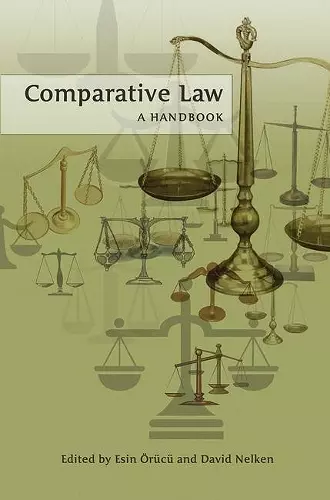Comparative Law
A Handbook
Esin Örücü editor David Nelken editor
Format:Paperback
Publisher:Bloomsbury Publishing PLC
Published:12th Oct '07
Currently unavailable, and unfortunately no date known when it will be back

This innovative, refreshing, and reader-friendly book is aimed at enabling students to familiarise themselves with the challenges and controversies found in comparative law. At present there is no book which clearly explains the contemporary debates and methodological innovations found in modern comparative law. This book fills that gap in teaching at undergraduate level, and for postgraduates will be a starting point for further reading and discussion. Among the topics covered are: globalisation, legal culture, comparative law and diversity, economic approaches, competition between legal systems, legal families and mixed systems, comparative law beyond Europe, convergence and a new ius commune, comparative commercial law, comparative family law, the 'common core' and the 'better law' approaches, comparative administrative law, comparative studies in constitutional contexts, comparative law for international criminal justice, judicial comparativism in human rights, comparative law in law reform, comparative law in courts and a comparative law research project. The individual chapters can also be read as stand-alone contributions and are written by experts such as Masha Antokolskaia, John Bell, Roger Cotterell, Sjef van Erp, Nicholas Foster, Patrick Glenn, Andrew Harding, Peter Leyland, Christopher McCrudden, Werner Menski, David Nelken, Anthony Ogus, Esin Orucu, Paul Roberts, Jan Smits and William Twining. Each chapter begins with a description of key concepts and includes questions for discussion and reading lists to aid further study. Traditional topics of private law, such as contracts, obligations and unjustified enrichment are omitted as they are amply covered in other comparative law books, but developments in other areas of private law, such as family law, are included as being of current interest.
undoubtedly an invaluable addition to the teaching arsenal of comparative law. Reza Banakar Professor, School of Law, University of Westminster, London International Journal of Law in Context Volume 5 Issue 1 (2009) In sum, the Handbook is not merely a reference work - a collection of informational pieces on the discipline - but also provides the average reader with a contemporary picture of comparative law. Jaakko Husa Maastricht Journal of European and Comparative Law 15:2 (2008) This new handbook is...very valuble, not only for the academic audience but also for students who may use this book instead of a traditional comparative law textbook. Mathias M. Siems The Edinburgh Law Review Vol 12 (2008) When it comes down to it, this Handbook is a worthy attempt to provide an accessible and useful overview of the fluid, contested and generally infuriating discipline of comparative law. ...this volume is undoubtedly a beneficial contribution to the literature in the field. Jennifer Hendry German Law Review Each chapter is introduced with a list of key words. A practical feature deemed particularly appropriate for students new to comparative law is a list [of] questions placed at the end of each chapter but before a bibliographical list including further reading. Moreover, the further reading given is sufficiently broad to be useful for novices and as well as more advanced comparative law scholars...this book offers the reader a valuable insight into contemporary debates on comparative law...The division of the Handbook into three sections is an accessible way of structuring the book. It enables the reader to gain a general understanding of the theoretical debates surrounding a subject area before seeing these debates applied in a field of substantive law...an excellent overview of twenty-first century debates and problems surrounding comparative law. Rebecca Zahn Web Journal of Current Legal Issues December 2008 The Handbook is a welcome addition to the literature. One of its benefits is that comparative law is put into context as it is considered from both theoretical and substantive perspective...A wide range of topics is covered and this will allow lecturers to 'pick and choose' whichever topics are most suited to their course. Dr Sylvie Langlaude Queen's University Belfast The African Journal of International and Comparative Law Vol. 16, No. 2, September 08 This collection of papers is as much an introduction to the challenges facing comparative law today, as it is an introduction to what it means to engage in interdisciplinary legal research. Reza Banakar International Journal of law of Context Volume 5, Issue 1 (2009)
ISBN: 9781841135960
Dimensions: 234mm x 156mm x 24mm
Weight: 724g
480 pages